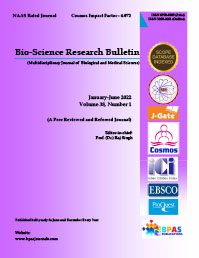Overview of Methylotrophic Microorganisms in Agriculture
DOI:
https://doi.org/10.48165/Keywords:
Methylotrophs, 1-aminocyclopropane-1- carboxylate, Nitrogen Fixation, Phytostimulation, BiocontrolAbstract
Methylotrophs are bacteria that can utilize single carbon compounds as their sole carbon source. These methylotrophic bacteria are present in the phyllosphere as well as in the rhizosphere. These bacterial populations promote plant growth by solubilizing phosphate, nitrogen fixation, acting as biocontrol agents, biosynthesis of phytohormones, and the production of 1- aminocyclopropane-1-carboxylic acid (ACC) deaminase and they also alleviate negative effects of salinity and are also involved in phytostimulation.
References
Abd El-Gawad, H.G., Ibrahim, M.F.M, Abd El-Hafez, A.A, Abou El-Yazied, A. (2015). Contribution of pink pigmented facultative Methylotrophic bacteria in promoting antioxidant enzymes, growth, and yield of Snap Bean. American-Eurasian J. Agriculture and Environment Sci., 15(7), 1331–1345.
Balaji, R.S., Dhamodharan, G., and Rajasekar, A. (2013). Isolation and Characterization of Methylotrophic Bacteria from Western Ghats. International Journal of Engineering Research and Technology (IJERT), 2(7), 2278-0781. DOI: 10.17577/IJERTV2IS70823
Bhattacharyya, P.N. and Jha, D.K. (2012). Plant growth-promoting rhizobacteria (PGPR): emergence in agriculture. World Journal of Microbial Biotechnology, 28, 1327–
Chauhan, P.S., Lee, G.S., Lee, M.K., Yim, W.J., Lee, G.J., Kim, Y.S., Chung, J.B., Sa, T.M. (2010). Effect of Methylobacterium oryzae CBMB20 inoculation and methanol spray on growth of red pepper (Capsicum annuum L.) at different fertilizer levels. Korean Journal of Soil Science and Fertilizer. 43(4), 514–521.
Chistoserdova, L., Kalyuzhnaya, M.G., Lidstrom, M.E. (2009). The expanding world of methylotrophic metabolism. Annu Rev Microbiology; 63, 477-
Doi 10.1146/annurev.micro.091208.0736 00.
Egli, Thomas & Mason, C.A. (1991). Mixed Substrates and Mixed Cultures. Biotechnology (Reading, Mass.). 18, 173-201. 10.1016/B978-0-7506-
-8.50015-2.
Grossman, K. (1996). A role of cyanide, derived from ethylene biosynthesis, in the development of stress symptoms. Plant physiology, 97, 772-775.
Hanson, R.S. (1980). Ecology and diversity of methylotrophic organisms. Advances in Applied Microbiology, 26, 3-39.
ICAR-Rice Knowledge Management Portal (2013) Use of biofertilizer in paddy to withstand drought. http://www.rkmp.co.in/mr/general
domain/news-and-events/use-of biofertilizer-in-paddyto- withstand drought.
Iguchi, H., Yurimoto, H. and Sakai Y. (2015). Interactions of Methylotrophs with Plant and other Heterotrophic Bacteria. Microorganisms. DOI: 10.3390/microorganisms3020137.
Ivanova, E.G., Trotsenko, Y.A. and Doronina N.V. (2001). Aerobic methylotrophic bacteria as Phytosymbionts. Microbiology 70(6), 623-632.
Jeyajothi, R., Lokanandhan, Subbalakshmi, Durrairaj, Nalliah. (2014). Effect of PPFM application on microbial population in transplanted tice. Trends in Biosciences, 7(22), 3573-3574.
Jayashree, S., Vadivukkarasi, P. & Anand, K. (2011). Evaluation of pink pigmented facultative methylotrophic bacteria for phosphate solubilization. Archives of Microbiology, 193(8), 543- 552.
Jourand, P., Giraud, E., Bena, G., Sy, A., Willems, A., Gillis, M., Dreyfus, B. & deLajudie, P. (2004) Methylobacterium nodulans sp. nov., for a group of aerobic, facultatively methylotrophic, legume root nodule forming and nitrogen-fixing bacteria. International Journal of Systematic and Evolutionary Microbiology, 54, 2269–2273.
Khan, M.S., Zaidi, A., Wani, P.A., and Oves, M. (2009). Role of plant growth promoting rhizobacteria in the remediation of metal contaminated soils. Environmental Chemistry
Letters, 7(1), 319-350. DOI: 10.1007/978-1-4020-9654-9_15 16.Kwak, M.J., Jeong, H., Madhaiyan, M., Lee, Y., Sa, T.M., Oh T.K. and Ki, J.F. (2014). Genome information of Methylobacterium oryzae, a Plant Probiotic Methylotroph in the phyllosphere. PLoS ONE, 9(9), e106704.
Madhaiyan M, Poonguzhali S, Sundaram S, Sa T. (2006). A new insight into foliar applied methanol influencing phylloplane methylotrophic dynamics and growth promotion of cotton (Gossypium hirsutum L.) and sugarcane (Saccharum officinarum L.). Environ Exp Bot, 57, 168–176.
Neilands, J.B. & Leong, S.A. (1986). Siderophores in relation to plant growth disease. Annual Review of Plant Physiology, 37, 187-208.
Peel, D. and Quayle, J.R., (1961). Microbial growth on C1 compounds. Biochemistry Journal, 81(3): 465-469.DOI: 10.1042/bj0810465
Rekadwad, B.N. (2014). Growth promotion of crop plants by Methylobacterium organophilum: efficient bio-inoculant and biofertilizer
isolated from mud. Research in Biotechnology, 5, 1–6.
Ryu, J., Madhaiyan, M., Poonguzhali, S. and Yim, W. (2006). Plant growth substances produced by Methylobacterium spp. and their effect on tomato (Lycopersicon esculentum L.) and red pepper (Capsicum annuum L.) growth. Journal of Microbiology and Biotechnology, Vol. 6 issue 10, page 1622-1628, ISSN 1738- 8872.
Siddiqui, Z.A. (2006). PGPR: Prospective bio-control agents of plant pathogens. In: Z.A. Siddiqui(ed). PGPR: Biocontrol and Biocontrol, Springer, Netherlands, pp. 111–142.
Yurimoto, H., Shiraishi, K., and Sakai, Y., (2021). Physiology of Methylotrophs living in the Phyllosphere. DOI: 10.3390/microorganisms9040809
Yavarpanah, Z., Alizadeh, M. and Seifi E. (2015). Effects of foliar and root applications of hydro-alcoholic solutions on physiological and biochemical attributes and fruit yield and weight of strawberry. Journal of Plant Physiology and Breeding, 5(1); 47-54.
